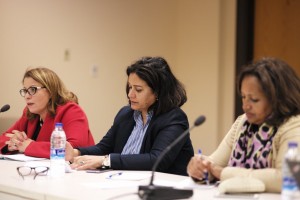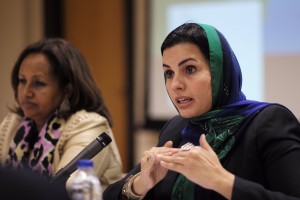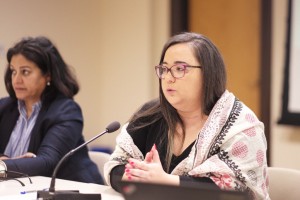Women, peace and security will be essential for development in the Arab region – UN told
Posted on: November 30, 2016, by : EditorWomen leaders from across the Arab region used the launch of the Arab Human Development Report in Beirut to highlight the importance of the women, peace and security agenda. A panel of experts told the launch that the region will not be able to build peace and achieve global development goals if it continues to exclude and marginalise women in political and diplomatic processes.
Published by the UNDP yesterday, the Arab Human Development Report paints a startling picture of a region experiencing unprecedented levels of conflict. Despite being home to just five percent of the world’s population, nearly half of all terror attacks target people in the region. The Arab world hosts almost half of the world’s internally displaced, well over half of the world’s refugees and nearly 7 out of 10 of the world’s battle deaths in 2014 occurred there.

In perhaps its most worrying section, the report suggests that if current trends continue, in 30 years three quarters of the region’s entire population could be living in a country affected by conflict.
The report notes that the level of conflict and instability in the region is having a disproportionate impact on women and girls. Wars and political instability can lead to the increase of early marriage, gender-based violence, and the marginalisation of women in public life. While the UN and its member states are committed to addressing such issues through the Women, Peace and Security agenda, implementation remains a problem – with only two Arab states having published National Action Plans stating how they will implement the agenda.
The panel discussion brought together expertise and insight from leading activists and professionals from Lebanon, Libya, Morocco, Somalia and Yemen. The session also heard from young women from Egypt, Iraq, Syria and Tunisia, who were able to talk about how their lives had been affected by the 2011 revolutions.
Hibaaq Osman, founder and CEO of Karama, the civil society organisation that led the session, said:
“As the UNDP report notes, women in the Arab region currently face unprecedented levels of violence and instability. The opportunities apparently presented by the revolutions in 2011 quickly closed up, as the forces of reaction rose against youth and women’s movements. The women who spoke today in Beirut all brought invaluable experience of how women in the region have first suffered from conflict and instability
“I was even more proud to see young women from the region being given the time to talk about the struggles they face in striving toward equality. It is
Zahra’ Langhi, co-founder and director of the Libyan Women’s Platform for Peace, said:

“I was happy to see the report addressing the prospects of Youth & development in the Arab region with an emphasis on peace & security and with a gender lens as well. The report highlights the tremendous effects of armed conflicts and militarisation on the prospects of young women and young men in our region. The numbers provided are alarming. Policy makers need to listen cautiously to these numbers and design their policies accordingly. There will be no sustainable development if there is no sustainable peace and in turn there will be no sustainable peace if there is no social equality.”
Ghida Anani, Founder & Director of ABAAD in Lebanon said:

“Women and Girls suffer today more than ever from the cost of war in the region. The number of women being affected by various forms of gender based violence, forced prostitution, child marriage, trafficking, domestic violence among other is highly visible. UNSCR 1325 and the women, peace and security agenda were meant to ensure the prevention of conflict, the protection of women, and women’s participation during time of conflict, however it is effectively invisible in gender-based violence programming during humanitarian crisis”.
Jamila Ali Rajaa, a member of Yemen’s National Dialogue, said:
“While this report is significant in its findings, I’m afraid it does not reflect enough on the appalling circumstances many women it in the region face. The crisis in Yemen sees 21 million people are reliant on humanitarian aid, while the country’s health system has completely collapsed, affecting women disproportionately. At the same time women and women’s needs are simply not part of the peace process.
“That it is why it was so important to hear perspectives from women involved in the region’s peace processes, and to give a platform for young women from across the region to share their experience.”
